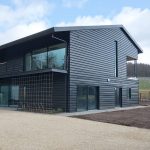Andrew Jefford hails the insights of a new climate study for future UK plantings…
Decanter’s Andrew Jefford praises Dr Alistair Nesbitt’s academic paper entitled – A suitability model for viticulture in England and Wales: opportunities for investment, sector growth and increased climatic resilience, as an outstanding piece of work. “I strongly recommend it,” wrote Andrew Jefford, “not only because of its insights into the potential for sparkling wine production in England and Wales, but also because its synthesis of a number of complex data sets suggests that we may, now, be getting closer to defining and to understanding terroir in a scientific sense.”
“Climate data is critical, and the authors are sceptical about the use of bioclimatic indices such as growing degree days on their own, calling them ‘crude measures of suitability that may mask or overstate true viticulture potential in a specific location’. Their model uses a growing season average temperature index and hourly sunlight data together with growing season total precipitation and inter-annual variability, June precipitation on its own (this being the flowering month in English and Welsh vineyards) and days of air frost in April and May, frost being the surest crop-killer of all. All this data is overlain, ‘fuzzified’ and crunched, though you’d need to be a trained analyst to understand the technical nuances of the authors’ approach.” Jefford continued.
Andrew Jefford’s full article in Decanter can be found here.
The full academic paper, by lead author Dr Alistair Nesbitt, with Professor Stephen Dorling and Professor Andrew Lovell, from University of East Anglia, can be viewed here.






